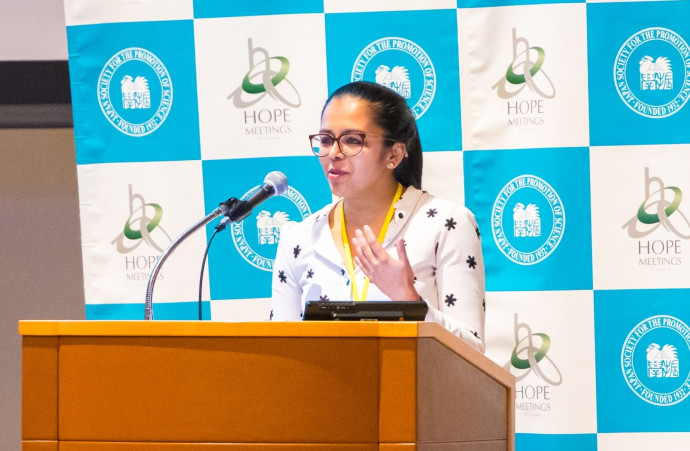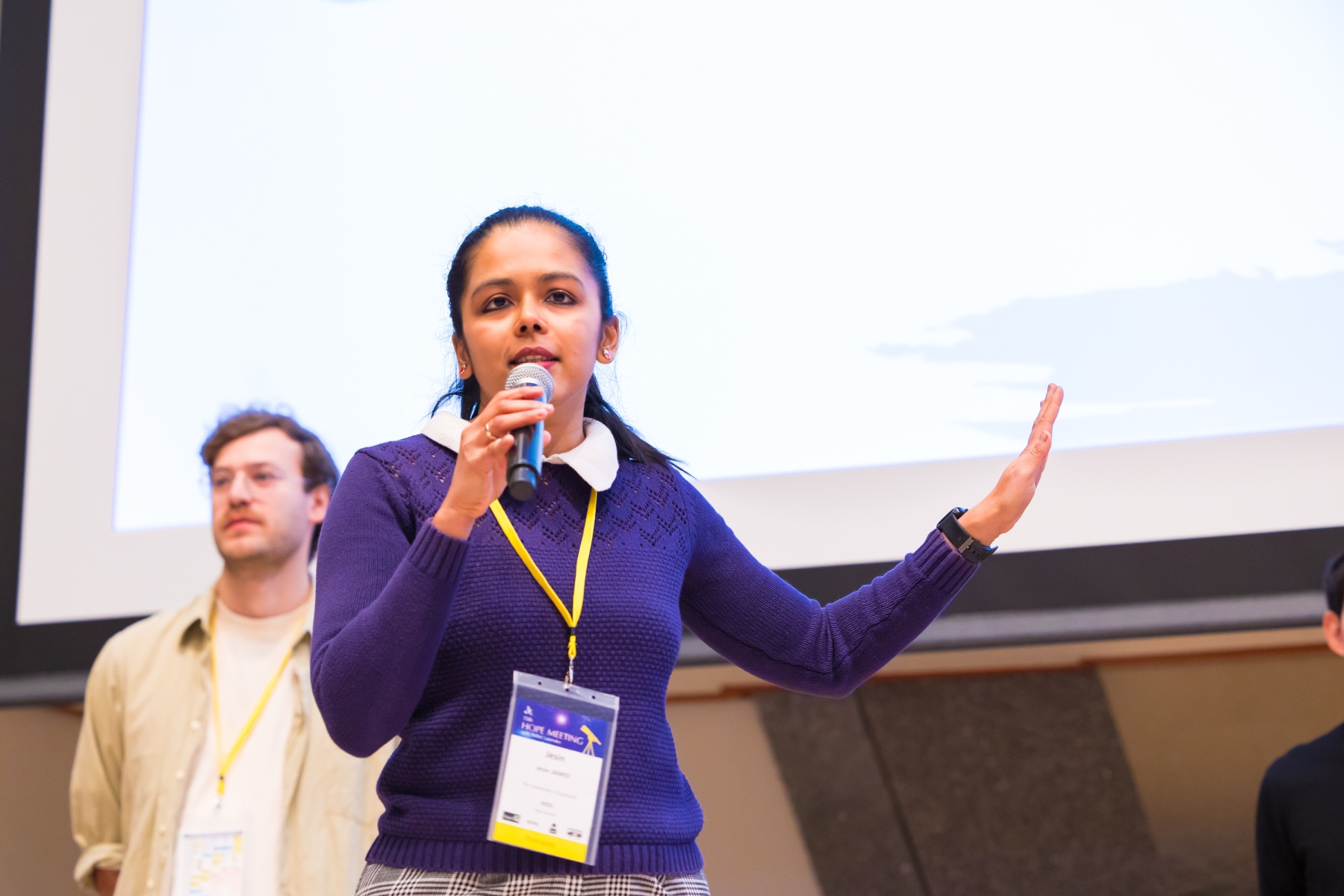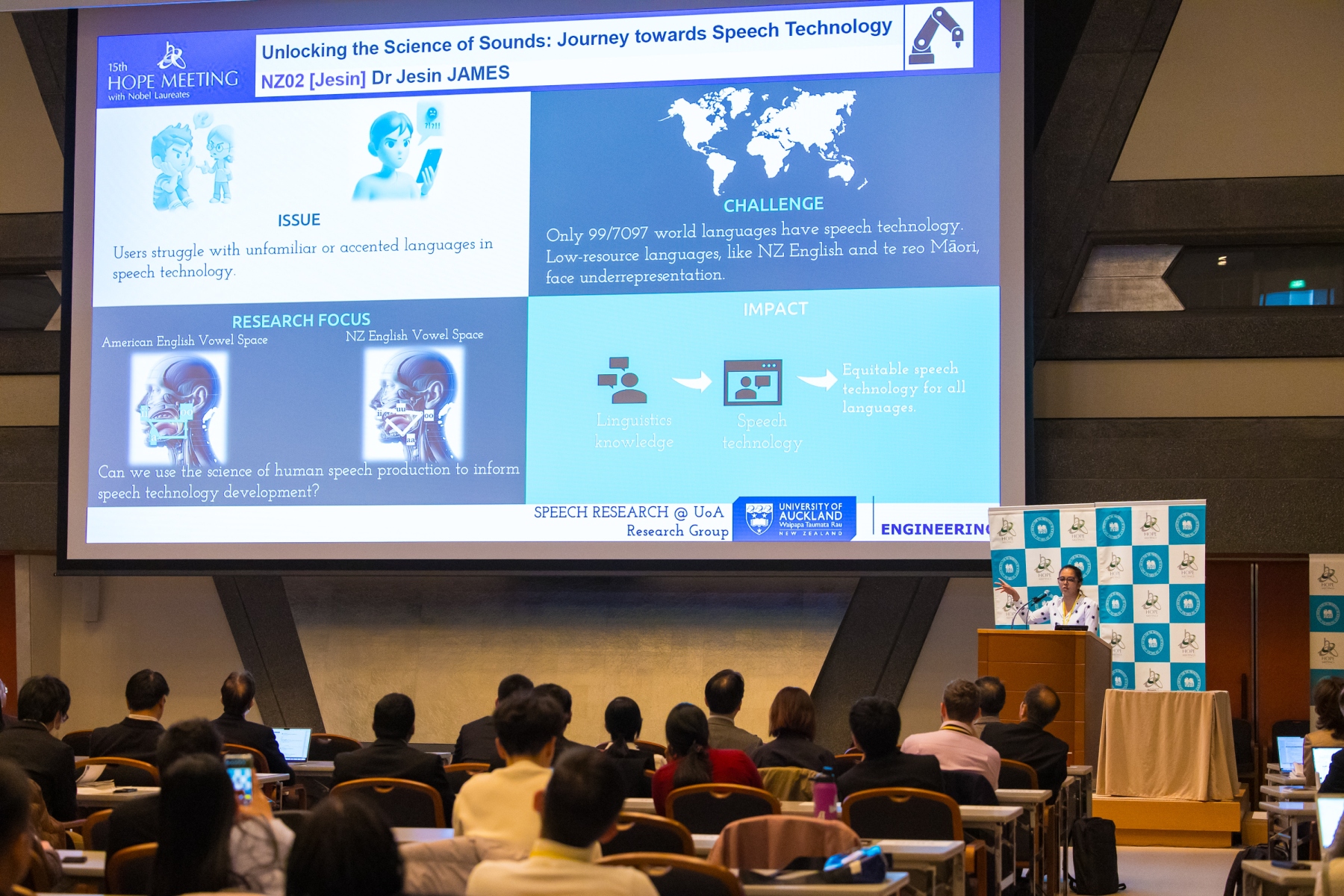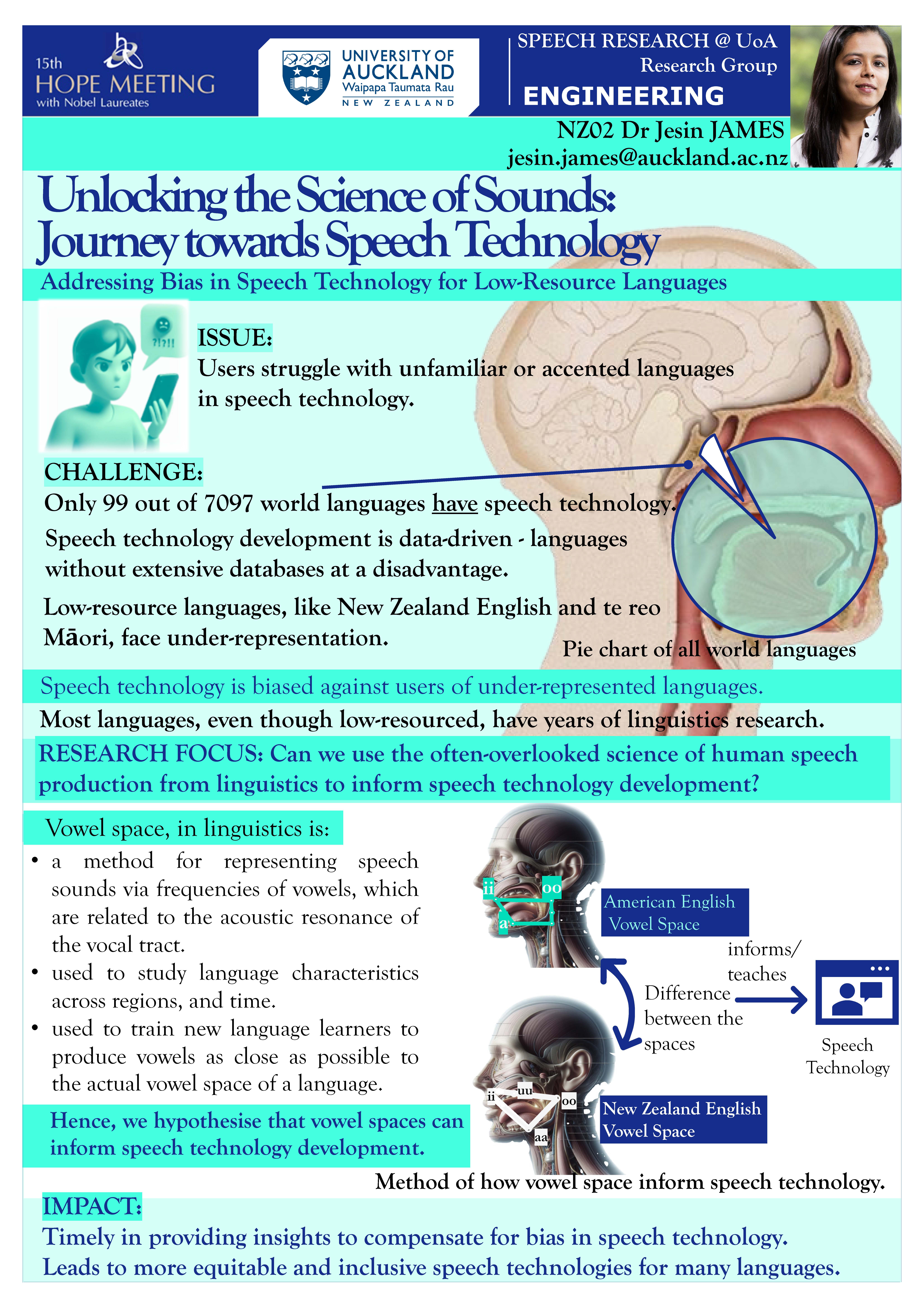News
Published 9 April 2024Finding HOPE and curiosity in Japan

Royal Society Te Apārangi selected Dr Jesin James, a Senior Lecturer from the Department of Electrical, Computer, and Software Engineering at Waipapa Taumata Rau | The University of Auckland, to attend the HOPE meeting in Kyōto, Japan, organised by the Japan Society for the Promotion of Science.
Jesin is working on developing inclusive and equitable speech and language technologies and she was awarded one of six 'best poster presentations' at the HOPE meeting. She found attending the meeting a very valuable experience and it has deepened her thinking into the foundational science that lies behind the technological applications she is developing.
About the HOPE Meetings
The Japan Society for the Promotion of Science (JSPS) has been hosting HOPE Meetings since 2008 to advance science and technology within the Asia-Pacific and Africa region. The meetings allow talented early-career researchers selected from countries and geographic areas to engage in interdisciplinary discussions with Nobel laureates and other distinguished scientists to foster wide perspectives that transcend individual disciplines.
Royal Society Te Apārangi selects 5 early-career researchers from Aotearoa New Zealand to attend the meetings, supported by Catalyst: Leaders funding from the Ministry of Business, Innovation and Employment.
This year 102 early-career researchers from Asia-Pacific and Africa attended the 15th Hope Meeting and met with Nobel laureates. The meeting spanned five days and consisted of talks from the Nobel laureates, small group discussions with each of them, and other opportunities to interact with them.
The participants were divided into groups, and prepared a group presentation on how scientists can help achieve one or many of the United Nations' Sustainable Development Goals. There were also cultural events, lab visits, and excursions to some tourist destinations in Kyōto.
The event broadened Jesin’s mind from a solely engineering focus to a wider science curiosity.
We asked her about her experience.
Q: How was your experience attending the HOPE meeting, what inspired you to attend?
A: Participating in the 15th HOPE meeting with Nobel laureates was an exceptional opportunity that significantly enriched my research experience and fostered valuable collaborations. Group discussions covered a range of issues impacting the scientific community, including work-life balance and publication requirements, providing valuable insights and perspectives. Interacting with participants from diverse backgrounds in the Asia-Pacific region further enhanced collaboration opportunities. The meeting's format, including group presentations, flash talks, and poster sessions, facilitated informal interactions and networking, laying the groundwork for potential future collaborations across disciplines.
I have only heard and read about Nobel laureates in the media, but getting to meet and mingle with them in person was a once-in-a-lifetime opportunity, which inspired me to attend the HOPE meeting. All conferences I usually attend focus on a particular research field. However, the HOPE meeting included early career researchers from many disciplines, spanning physics, chemistry, biology, medicine, and engineering. The diversity of the participants from all over Asia-Pacific and Africa, as well as the variety of their research topics, was another factor that motivated me to attend the meeting.
My research area is speech technology development. Through the flash talk and poster presentation I gave in the HOPE meeting, I was able to emphasise how your language knowledge (which is developed from birth) can be used to develop technology. The participants of the HOPE meeting were curious about this connection and asked me many questions in this space. This has provided more reach to my research field. My poster based on my research topic “Unlocking the Science of Sounds: Journey towards Speech Technology”, was awarded one of the best poster presentations at the 15th HOPE meeting. This has further helped promote my research into ensuring that equitable speech technologies are developed for all language speakers.

Q: What did you get out of attending the conference? Did you learn something new or make connections with new people?
A: I am from an engineering background, so my training has always taught me to approach projects from an application point of view. The application is what drives the majority of projects in engineering. Most of the people (participants and Nobel laureates) who attended the HOPE meeting are from science backgrounds. The majority of their research was curiosity driven. Attending the HOPE meeting broadened my thought process and encouraged me to be curious about the science behind engineering solutions. The meeting has helped to extend my research to understanding why and how things work instead of just focusing on making them work for a particular application.
I also met and interacted with researchers from other parts of Asia-Pacific and Africa. I heard their stories about how issues in different countries and the priorities of the governments impact their research. However, I also noted that everyone was passionate about science and trying to contribute to their research field in the best way possible despite their limitations. I met a researcher from Thailand who was using their medical science research to inform Thai communities on how to access elder care. I also met researchers from Israel who are doing research amidst the political unrest in their country. Another researcher I met was from Myanmar, who can no longer return to their country due to political issues and is researching in another country.
The Nobel laureates also shared inspiring stories of how they are using their position to bring change to the scientific community. Learning about Dr David MacMillian's (2021 Nobel Prize in Chemistry) Foundation to create student education opportunities was particularly inspiring, and Dr Paul Nurse's (2001 Nobel Prize in Physiology or Medicine) thoughtful hiring initiatives at the Francis Crick Institute.

Q: Please explain your research?
A: My overarching research aspiration is to bridge the gap between technological advancements and societal needs, particularly within the domain of speech and language technology (technology that we can talk to or that talks to us. e.g., Alexa, Siri). How we speak results from our native language and the other languages we are exposed to during our lifetime. People should not be forced to speak a certain way so that technology understands them; instead, technology should be able to understand our diverse languages and accents. I aspire to develop inclusive and equitable speech technologies that transcend linguistic barriers and celebrate cultural diversity.
Most of the speech technology developments we see around us are data-driven. The current approach to developing these technologies is to train models with large amounts of data representative of all the sounds in a language. While this works well for well-resourced languages such as American English, the same cannot be said for underrepresented languages such as New Zealand English and te reo Māori. This explains why Siri/Alexa cannot understand our accents/languages or why the technology does not speak in our accents/languages. This experience is also familiar to te reo Māori and New Zealand English speakers In Aotearoa. Even though there is not a lot of data in many world languages, years of language (linguistics) research have been reported in them. The characteristics of languages and how one language/accent differs from another are all recorded in linguistics studies. My research looks at incorporating our knowledge of languages to inform speech technology development, thereby reducing the reliance on large amounts of data.
The research I presented at the HOPE meeting builds on the overarching theme of my research into building equitable speech technology for all languages. The specific idea of using linguistics knowledge to inform speech technology I presented at the HOPE meeting is ongoing research funded by the Marsden Fast Start Grant.
Marsden Grants are an opportunity to explore foundational knowledge (science). In my research, I aim to understand the mechanisms that cause language bias in speech technology and how it can be reduced with linguistics knowledge. Hence, I have been asking some fundamental questions in my research lately. Attending the HOPE meeting during this time has encouraged me to ask more science questions and not be obsessed with the applications. I am now more curious about how human speech production works and how that can inspire us in technological development. There is a lot of merit in understanding the science behind speech production, as it improves our knowledge of our mechanisms of speech production and can inspire our technological developments.

Q: Is there anything else you'd like to add or discuss?
A: Even though this is not related to the scientific aspects of the meeting, I must commend the exceptional organisation of the meeting. The HOPE Secretariat thought about all possible aspects of the meeting and ensured that all participants were communicated clearly. All our requests were carefully addressed. Care was provided to ensure a comfortable stay and a great experience.
Japan was also the perfect venue for a meeting of this nature. Historically, Japan's interest in scientific research ensures that many researchers and research institutions in Japan have been doing high-quality research for many years. Getting an opportunity to interact with these researchers and visit some research institutes was thought-provoking.
In conclusion, the 15th HOPE Meeting was a transformative experience that deepened my appreciation for the power of collaboration and scientific inquiry. I am grateful for the opportunity to participate and look forward to incorporating the knowledge and insights gained into my future research endeavours. I sincerely thank Royal Society Te Apārangi, Ministry of Business, Innovation and Employment, New Zealand and JSPS for supporting my attendance. I also thank the organisers and fellow participants for making this meeting a memorable experience.

